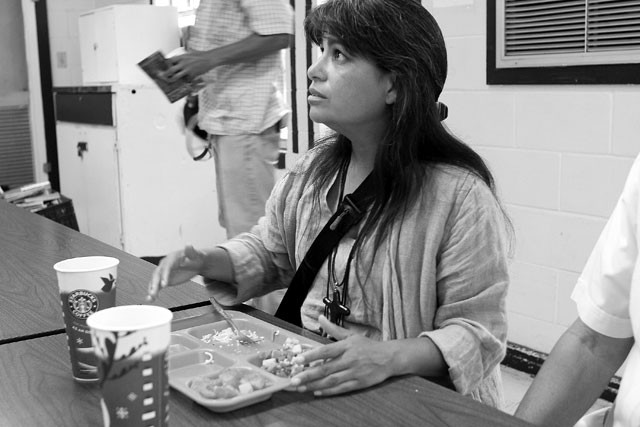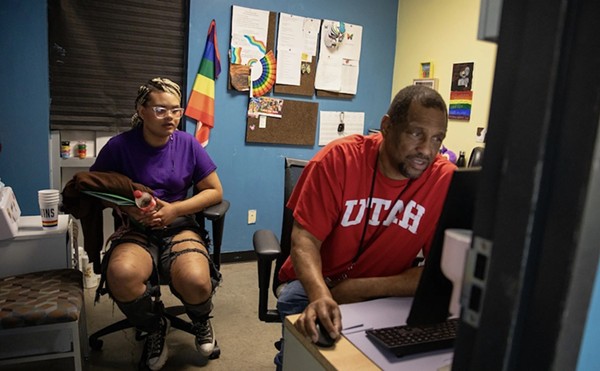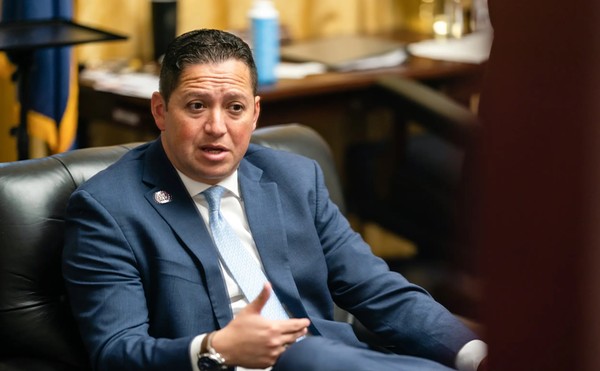
After a week living on the street, Lorenza Andrade-Smith’s focus is drifting. “It hasn’t been long and I’m already exhausted,” she says, heaving a bulky backpack off tired shoulders and onto a nearby park bench at Alamo Plaza. The blazing July sun has fallen, and the tourists are dissipating as she starts to settle in for the night amidst the gathering dusk. “I’m sorry. Could we move over there?” she asks me, motioning to another steel bench across the plaza. “There’s no bar in the middle of that bench. … I’m going to try to sleep soon, and that one’s much more comfortable.”
At 42, Smith has already led several lives: that of a U.S. Air Force cadet, a housewife and mother, and the pastor of a United Methodist congregation in San Antonio. Now an outspoken advocate with a penchant for protest, Smith has sold all her possessions, rejected her church salary and benefits (which she estimates at around $45,000 a year), and traded her bed for benches, park grass, and parking-lot asphalt. This life has become her newest protest on behalf of the poor and marginalized, she says, a fight for “systemic change.”
Over the past month, Smith has shifted between shelters, local rallies, the U.S./Mexico border, jail cells, and meetings with local faith leaders at a furious pace. Belying her short stature and soft-spoken nature, she’s latched onto politically charged social movements that have begun to push her into the spotlight.
Sitting on her park bench, Smith tells me what’s behind her new cause. “Really, the goal of this is to be in community with those who do not have a voice. … I’m learning from them, this isn’t charity.” Local nonprofits estimate as many as 3,500 to 4,500 sleep on the streets or in shelters each night in San Antonio, and Smith is now one of them. As darkness settles on the square, Smith says, “How can I even begin to advocate for them, for what they really need, if I don’t know them or understand where they’re at?”
Pieces of Smith’s past foreshadow the causes that would later consume her. Growing up in the Rio Grande Valley, her small Brownsville church doubled as a settlement house for South and Central American migrants. When we talk of immigration, and the fiery political debate surrounding it, she tells childhood stories of meeting these immigrants as they passed through, repeatedly drawing on words like “humanity” and “compassion.” While she would later work within the church pushing for HIV/AIDS education, prevention, and treatment, it was her brother who opened her eyes to the crisis when he tested positive for HIV five years ago. And, while still contentious in many religious circles, Smith openly talks of fairness and equality for the LGBT community — the same brother, she says, came out to her family when he told them he was HIV-positive.
“That was hard, it was a hard time for the family,” she says. “I mean, my mother would ask me that, since I’m part of the clerical, ‘Is your brother going to hell?’ That was a rough thing to handle.” While she identifies as Christian (an effort aimed at “truly imitating Christ” guides her advocacy, she says), Smith, in her public prayers amid actions and local protests, encourages others to “follow their own faith tradition.” Her own son converted to Islam two years ago.
Prior to entering the St. Paul School of Theology in 2005, Andrade served as a U.S. Air Force air-traffic controller, where she met her husband. Though she’s still married, Smith and her husband haven’t lived together since she joined the seminary, she says. She moved to San Antonio two years ago when she finished at St. Paul, becoming Westlawn United Methodist Church’s first-ever woman pastor.
“There’s a lot about Lorenza that’s unique. She’s radical, with a fearlessness that is much bigger than her little short stature,” said Rev. John Feagins, who leads UTSA’s United Methodist Church. Last year, Feagins invited Smith to meet a group of local students gearing up for a loud and public fight to pass the DREAM Act, legislation that would have provided a pathway to citizenship for those brought into the country as children if they attend college or join the military. A presentation Smith had given at the university on a project she was involved with in the Arizona desert, walking the desolate migrant trails from the border to leave water along the way, put Smith in Feagins’ mind, he said.
“I was impressed with where she stood on the issue. She’s a personal friend and somebody who I knew would care about what was happening,” Feagins said. “I knew then that she was willing to be radical, and I knew those kids needed help from somebody like her because they were preparing to take some pretty radical steps.”
Smith and a score of local DREAM Act students ignited a firestorm in November. After repeated protests and pleadings for an audience with Senator Kay Bailey Hutchison, seen then as the swing vote standing in the way of the DREAM Act’s passage, Smith and seven local students embarked on a debilitating 30-day hunger strike in protest (See “Escalation in DREAM fight leads to 16 arrests,” December 1, 2010). During a sit-in at the Senator’s office, Smith was arrested along with 15 other activists, including former San Antonio Councilwoman Maria Berriozábal.
“I never really knew her until we met in that jail cell,” Berriozábal said. “She made an impression on all of us. Since then, I’ve continued to be impressed with her quest for justice.”
While the others left their jail cells the next day, Smith escalated, refusing to make bond until a vote on the legislation while adopting a complete fast — refusing water and food.
Following Smith’s arrest, Bishop James E. Dorff, of the San Antonio Episcopal Area of the United Methodist Church, released the statement: “I do not condone nor recommend breaking the law and she is aware of that, but I appreciate the depth, compassion, and sense of commitment she has to seeking some kind of just immigration reform.” Dorff, Smith says, later agreed to her new appointment to the streets living with the poor and marginalized — an appointment she expects to last at least three years.
“Lorenza appeared within our inner circle and conversations at a very important time for us. Back in November 2010, it was the beginning of our escalation, of having undocumented youth come out of the shadows,” said Felipe Vargas, a DREAM activist arrested alongside Smith at the senator’s office. “There were these huge changes happening in the risk youth were willing to take, and from the very beginning Lorenza was clear she was there in solidarity, real solidarity. She was willing to take risks, too.
“I mean, look at what she was willing to do,” Vargas said. “If we were going to go to jail, she was going to jail with us. If we were willing to starve ourselves, so was she. And while we were scared and nervous, she was like this piece of stone that was solid, cool, collected,” he said.
While her supporters and friends don’t question her sense of mission, many worry about Smith’s new path. “You can imagine what a lot of people probably think of a person who gives away their vehicle, who puts on burlap or canvas like a mendicant wandering monk, and goes and lives on the streets,” Feagins said. “The worry I have with her strategy is that it’s only going to last as long as people still acknowledge her as a rational part of the clerical community. But this is a radical step she’s taking, and before too long, I’m worried, they might just see her as another street person. … I introduced her to those DREAM Act folks. I feel like, in a way, that maybe I even set her on the road somewhat to where she is right now.”
Claudia Sanchez, another student and activist arrested with Smith during the DREAM Act push, spoke of Smith with admiration, but said she’s worried about her health and safety living on the streets. “She’s risking herself, putting herself on the line. I’m worried for her, it can be dangerous, especially for a woman.”
For her part, Smith admits to feeling the pressure of being pulled in many directions. “I’m still finding where exactly I’m going to dedicate my time, my energy,” she says.
Last month, Smith trekked across the expanse of the U.S./Mexico border, starting at dawn near Brownsville’s Boca Chica Beach, where the Rio Grande meets the waters of the Gulf. For 10 days, she traveled along both sides of the border, hopping busses and hitching rides with friends and family. After spending a short time in Juárez, she caught a ride back to San Antonio in time for a protest outside the Grand Hyatt for downtown hotel workers (See “Hyatt protests escalate,” July 27, 2011).
When I caught up with Smith at the Unite Here rally downtown, she was about to be arrested — as requested by protest organizers — but was clearly hesitant about going through with it. And District 1 Councilman Diego Bernal and former Councilwoman Berriozábal tried to talk her out of it, Smith says. After stepping away from the crowd, crouched in prayer for several minutes, she walked back to the protest, joining 10 others in the street before police took them away.
“The thing I worry about in Lorenza’s case is that she’s in danger of spreading herself too thin,” Feagins says, “that she just becomes a professional protestor, that anytime somebody’s out there with a placard for any kind of left-wing protest, that she’s going to be there.”
Smith’s stalwart activism has ratcheted up quickly, the hunger strike, the arrests, and her choice to be homeless sprouting up just within the past year. On the local level, Smith represents a tightening tie between mainstream religion and social-justice activism, Feagins said. It’s a segment of Christianity that stands in stark contrast with that displayed by the Religious Right, key players of which will converge on Texas this week for the “Response,” the Governor Rick Perry-sponsored prayer event in Houston.
“There’s a whole lot of various forms of civil rights movements. There’s gay rights, gay marriage, a spattering of immigrant-rights stuff, and there’s these movements for public workers,” Feagins said. “I believe that we’re passing into a time where people, including many of those in the church, are fed up, and that this stuff is going to get more intense, like in the ’60s,” he said. “That’s where I see Lorenza playing a role.”
At my last meeting with Smith, I find her waking up in a parking lot outside of the University of Texas’ United Methodist Church in Austin, where the staff allow the homeless to camp at night. It’s only been a month, but she looks drained, exponentially more tired than our last meeting. She says she still doesn’t sleep much. Apart from her backpack, cell phone, and walking stick, she’s acquired one new possession: a screwdriver. She laughs and says a new friend gave it to her in case she needs to protect herself.
I give her a ride back to San Antonio; for the past week, she’s been Greyhounding between the two cities for meetings with various groups, meetings about immigration, workers rights, homelessness. We continue to talk about why she’s doing what she’s doing, if people will think she’s crazy, and whether or not that even matters. Talking about her new life, she says, “It hasn’t been long. I feel like I’ve already learned so much. … Just the idea of wanting a little bit of respect, feeling looked down on all the time out here. … I now know how it lifts the soul when someone shows genuine kindness out here. That’s the kind of thing I’m trying to learn.” •


















